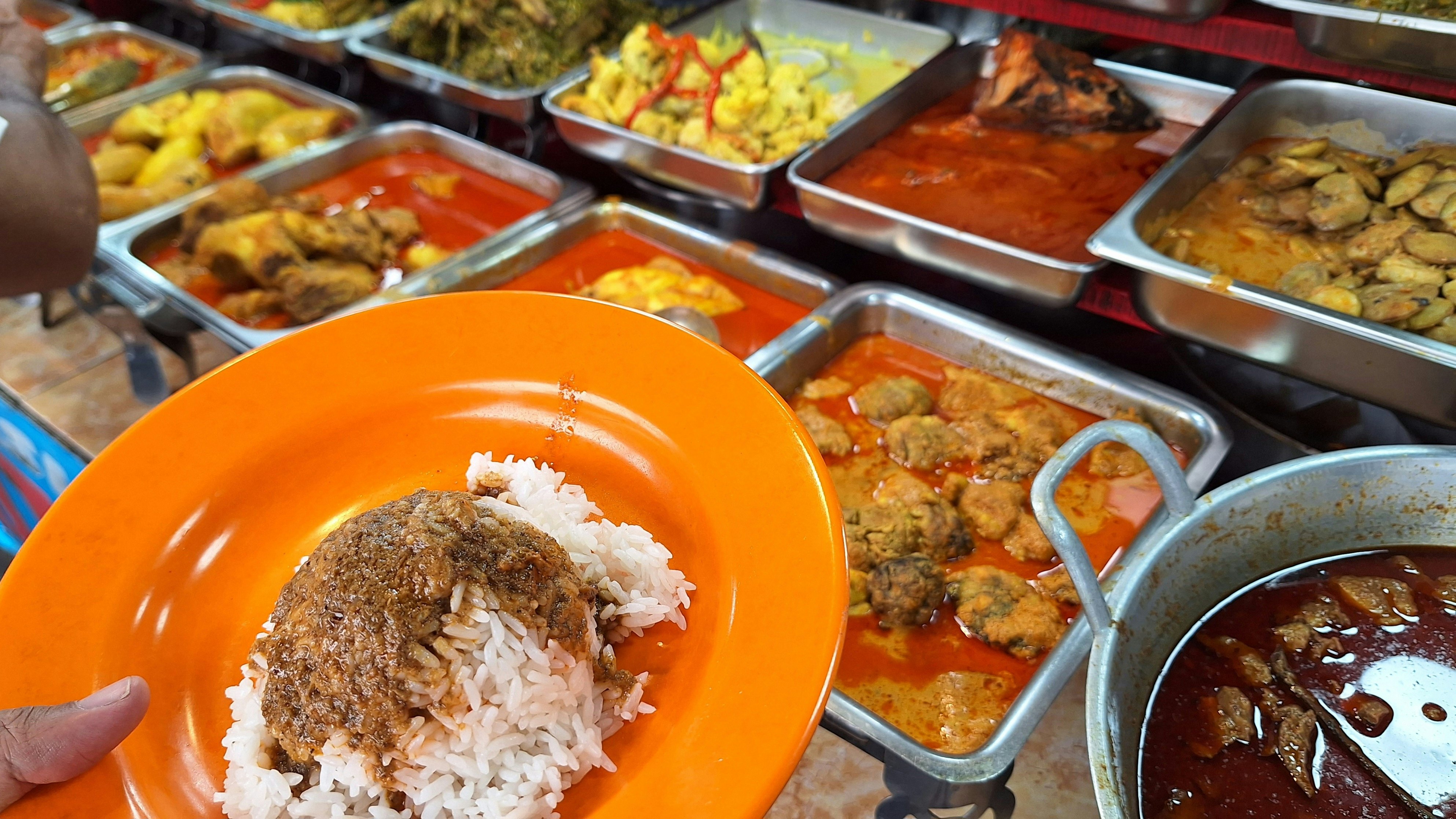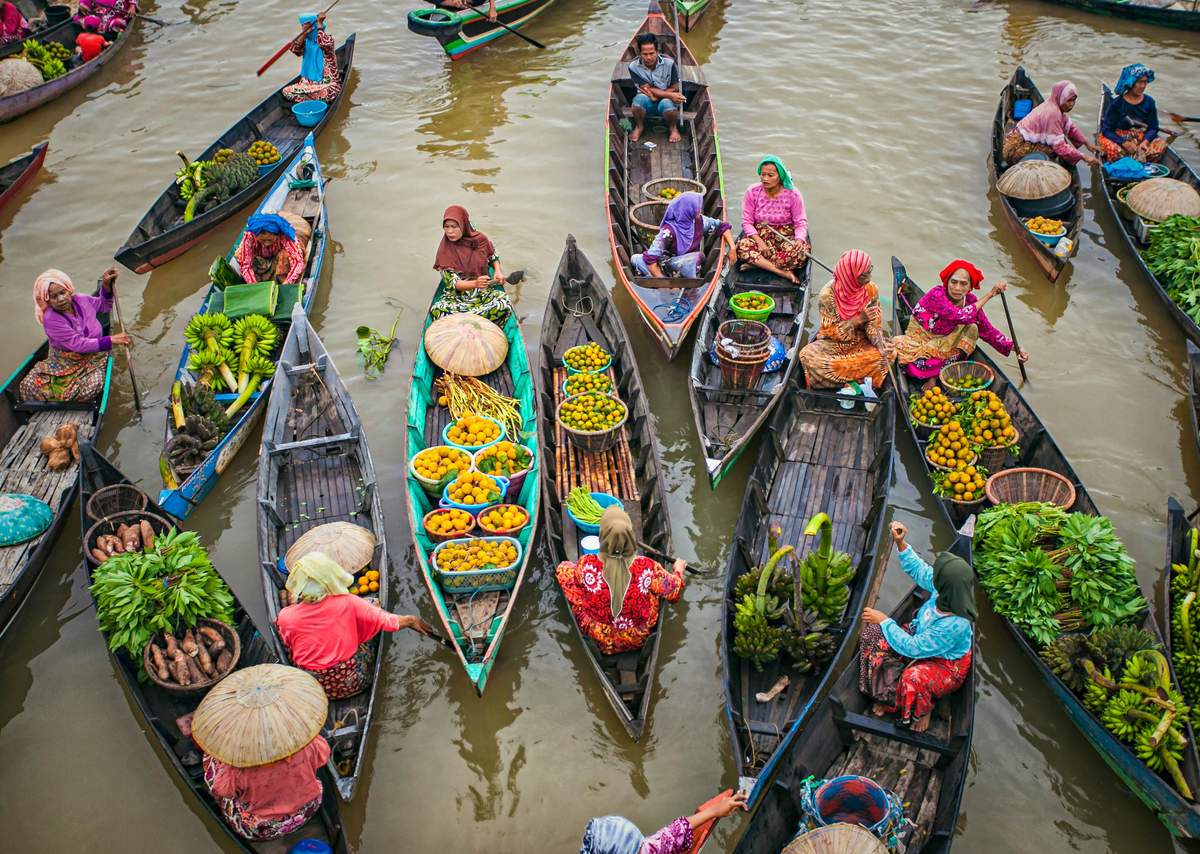

Sample the best flavors of Indonesia with this guide to dishes and drinks © Nora Carol Photography / Getty Images
The traditional foods of Indonesia never quite get the credit they deserve. Thousands of islands spread across three time zones ensure a culinary diversity like no other nation.
The country’s signature dishes, from fried rice, noodles and satay, are all very accessible and simple to make. Still, Indonesia’s culinary heritage comprises many rich and complex flavors, such as the famed rendang (beef coconut curry).
Rice and spicy sambal chili paste are mainstays of the cuisine and, with the prevalence of vegetables, soybean and tofu, vegetarians won’t go hungry. Home to the famed Spice Islands, Indonesia has influenced the cuisines of many lands but has also in turn embraced elements of Chinese and Dutch food heritage. While there is no shortage of high-end eateries, the most rewarding experiences will almost certainly be found in the teeming night food markets.
Here's our guide to the best things to to eat and drink in Indonesia.
Start your culinary journey with nasi goreng street food
Any guide to Indonesian food will almost certainly start with Indonesia’s answer to the humble fried rice dish. Nasi goreng ayam (fried chicken rice) is a staple but expect all manner of regional nuances. The classic version is fried in sweet soy sauce, chili and other subtle spices with a large prawn cracker and a fried egg on top. The mie goreng (fried noodles) variant is just as ubiquitous across Indonesia. These are cheap street eats for less than $2.
Where to try it: Egoiste Beach Restaurant, Gili Trawangan

Go nuts for sate
Sate (or satay) is another cheap street food that has transcended its humble origins. It’s virtually a mainstay of Asian restaurants the world over. This crowd-pleasing street snack consists of small chunks of skewered chicken grilled over a charcoal fire. Sate's secret weapon is the thick, dark peanut paste with a sweet, tangy flavor. As well as chicken, street vendors serve up sate goat, beef and seafood. It is reputedly one of ex-US President Barack Obama’s childhood favorites.
Where to try it: Sate Khas Senayan, Jakarta
Babi guling is a Bali culinary institution
Unique for the world’s largest Muslim nation, babi guling (spit-roast pig) is a characteristic Bali creation. It is stuffed with garlic, lemongrass, shallots and chili before hours of slow roasting on the spit. Aside from specialist babi guling vendors, you’ll likely need to preorder this a day before. You get a big chunk of succulent meat with turmeric-marinated dark crispy skin alongside steamed rice, vegetables and spicy sambal chili paste.
Where to try it: Ibu Oka or Warung Nia Seminyak, Ubud, Bali

Sample rendang, a feast for the senses
Simmered in coconut milk and exotic spices, rendang (beef coconut curry) is perhaps the crown jewel of Indonesian cuisine. It is slow cooked until the liquid reduces into a thick, dark paste. It elicits a rich, almost sate-like texture but with a very unique mix of powerful flavors. There is a distinct art to cooking it. The "dry rendang" way actually preserves the meat and can be eaten up to a month later. Rendang is perhaps the one Indonesian dish that has gained a truly global following, ranging from a $3 dish in a backstreet Jakarta cafe to an ultra-expensive Wagyu rendang in a high-end New York restaurant.
Where to try it: Kemangi, Kuta, Lombok
Get spicy with fiery food from Padang
Padang in Sumatra is Indonesia’s most celebrated culinary region. The famed rendang is a Padang creation. This regional concept is infamous for its fiery hot chili infused gulai (curry). There are many unique facets to Padang food, not least how it is served. Choose a specific dish or wait staff will stack the table with a dozen or more small plates without prompting. As long as you keep eating, more food keeps arriving and diners simply pay for what they eat. The sheer variety is mind-boggling, including a huge variety of vegetarian dishes. Spicy Padang treats include dendeng balado (beef jerky), chili crabs and gulai itik (duck curry).
Where to try it: Natrabu, Sanur, Bali

Taste lots of Indonesian dishes with a rijstaffel banquet
A typical visit to Indonesia will barely scratch the surface of the archipelago’s culinary scope – unless you use the rijstaffel cheat code. This is an accelerated way to find out exactly what foods Indonesia is known for. Translated from colonial Dutch as "rice table," this is a mind-boggling array of up to 40 small dishes served buffet style. A huge mound of yellow rice arrives at the table surrounded by small bowls of noodles, curries, seafood and savories like spring rolls. Typical rijstaffel components include gado-gado (vegetables in spicy peanut sauce), clear chicken soup, crispy duck, and perkedel (fritters).
Where to try it: Dapur Raja, Ubud, Bali
There are virtually unlimited options for vegetarians
Due to cost and limited availability of meat in some regions, virtually all of Indonesia’s signature dishes have some established vegetarian variation, from fried rice and noodles to sate. Tofu and soybean are the backbone of many dishes, while spicy Padang cuisine boasts dozens of popular vegetarian dishes. Furthermore, there are specialist vegetarian cafes and restaurants in most cities and major tourist areas.

Dive into the stinky durian
The infamous durian invokes both fear and curiosity. Dubbed the “king of fruits," it is notorious for its hellish smell but compensates with a heavenly taste. This may not be on most people’s wish lists of what to eat in Indonesia but it most certainly should be. It’s an exotic delicacy with a yellow-brown spiky outer skin. The fruit has a thick meat-like consistency emitting that overpowering smell.
The late Anthony Bourdain described it best: "Your breath will smell as if you'd been French kissing your dead grandmother." Perhaps overdramatic but the odor is extremely pungent. When eaten it elicits very conflicting senses between the unique taste and that overbearing stink. It’s possible to ease yourself slowly into the durian experience with a tub of refreshing durian ice cream.
Where to try it: Rimba Durian café, Jakarta
Down a shot of Bali firewater arak
Bali’s famed hard liquor is arak, a traditional, clear liquor sold in bars and consumed at community celebrations. The alcohol content is high at 40%, with double distilled arak at 60%. It takes its name from the sap of the palm tree which is then fermented and distilled. Interestingly, it’s the first alcoholic drink recognized for cultural significance in Muslim majority Indonesia. In fact, there is an annual Arak Bali Day celebrated every January.
A word of warning: black market arak is the biggest source of methanol poisoning in Indonesia. There have been some cases of tourists dying after drinking tainted home-made arak. Stick to branded arak sold in bars and politely decline an invitation to sample any home-made hooch.
Where to try it: Potato Head Beach Club, Seminyak, Bali
Sip a cendol sweet dessert drink
Cendol is best described as a sugary fruit medley in liquid form. This is one of Indonesia’s multicolored coconut milk concoctions with a strange combination of fruits and confectionery. It all looks very random but it’s a visual treat and tastes delicious. It comprises coconut milk, palm sugar syrup, shaved iced, and small green jellies made from rice flour. Depending on the region, various fresh fruits are added including pineapple, jackfruit and even the infamous durian. It's a cool and refreshing alternative to a post-dinner dessert.
Where to try it: Dewi Sri Food Center, Kuta, Bali
















